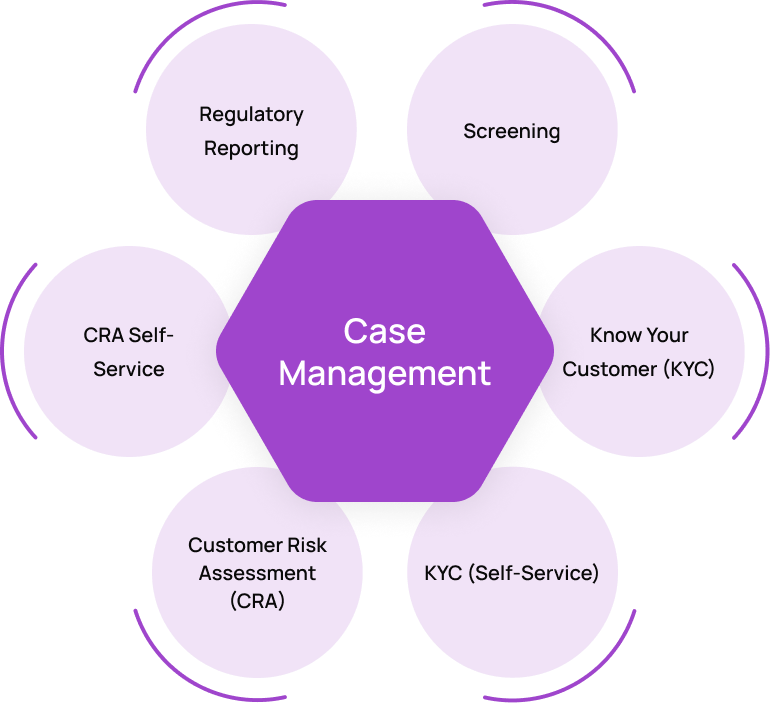
RapidAML is a product planned to be developed and launched to assist Designated Non-Financial Businesses and Professions (DNFBPs) and Virtual Asset Service Providers (VASPs) in handling their anti-money laundering (AML) compliance rapidly and effectively.
The theme of the AML compliance solution was set – to address the compliance-related pain points a DNFBP or a VASP faces.
End-to-end support in the AML compliance journey of a DNFBP and a VASP is the ultimate goal to be achieved with RapidAML.
With this end target in mind, the RapidAML team and the associated AML professionals jotted the modules with which the solution should be enriched. A whiteboard of a conference room was bifurcated into two halves – one for carving out the customer onboarding lifecycle, and the AML regulatory compliance obligations made it to the second half of the board.
This mapping of compliance and risk mitigation measures revealed the basic AML modules or components we wanted to build in the proposed solution to meet our vision of being DNFBPs' and VASPs' one-stop solution for AML compliance.
High-level understanding of the sections under RapidAML

Here, we have just captured a high-level idea of how the solution and components will add value to the AML compliance function of the DNFBPs and VASPs (the details of problems each module plans to address and how the specifications were written will be presented in the upcoming updates).
Screening
Know Your Customer (KYC)
KYC (Self-Service)
Customer Risk Assessment (CRA)
CRA (Self-Service)
Regulatory Reporting
Case Management
The screening module offers a comprehensive database to DNFBPs and VASPs to conduct customer name screening to detect if any of their customers or beneficial owners are locally or internationally designated under the relevant sanctions lists.
This is not limited to sanctions checks, but adverse media checking and identification of customers' status as politically exposed persons (PEPs) – domestic or foreign – are also supported by RapidAML's screening module.
With RapidAML's screening solution, not only are screening issues addressed, but a big relief is also around customer document management.
The objective here is to empower the DNFBPs and VASPs to spot the sanctioned or other high-risk indicators associated with negative media or PEP promptly before the onboarding of the person as a customer and also on an ongoing basis, along with customer identification document management functionality.
Moving a step ahead in the customer onboarding journey. KYC is a crucial activity in the AML compliance exercise, where a lot of time and energy is spent collating the information, corresponding data, and document management.
With RapidAML's KYC segment, the idea is to ease and automate the KYC process of DNFBPs and VASPs, enabling accurate, efficient and rapid completion of the customer identification process. The vision is to offer standard KYC forms and checklists to the users, with 100% rights to modify and configure the KYC templates in accordance with their AML Program and applicable regulations.
With system-driven KYC and smooth customer documentation management, the hassle of saving images and PDF files on the desktop is eliminated. Get a clear and complete picture of the customer identification details with a click on a single screen.
The plan is to extend the KYC platform for direct use by the end customers of the DNFBPs and VASPs. The KYC self-service module. This shall relieve the DNFBPs and VASPs of collecting customer information through manual channels, encouraging the customers to populate and provide their details and documents on the platform.
The common issue in customer onboarding is the KYC data is not readily available to the customer. Even if the data is readily available, the customer is not physically available to complete the process. Remote customer onboarding is the most sought-after feature.
RapidAML's KYC (Self-Service) empowers customers to complete their KYC from the leisure of their home. The compliance team gets an instant notification on the completion of the form by the customer to onboard the customer in no time!
Customer risk assessment is generally done using flat files developed by the DNFBPs based on some factors and formulas. Managing and regularly updating these flat files is a cumbersome process. With this context, this module of RapidAML effectively translates flat files into a system-driven process.
RapidAML aims to provide affordable and user-friendly customer risk assessment solutions to DNFBPs and VASPs. These solutions can automate the risk profiling process, leveraging technology to improve efficiency and accuracy in risk identification.
CRA (Self-Service) is aimed at automating customer risk assessment by sharing a questionnaire with the customer to obtain the relevant details from the customer. Once the customer fills out the form, the risk analyst gets an instant notification to complete the risk assessment of the customer.
With all the customer and transaction-related data available on the solution, then why not assist the DNFBPs and the VASPs with draft regulatory reports with complete and accurate information?
The regulatory reporting section aims to flag transactions or customers that warrant mandatory reporting to the Financial Intelligence Unit and make a corresponding draft report available for review and further submission.
An overarching section of RapidAML complementing the above-mentioned modules. Acts as a data aggregator and workflow manager for all modules and sets up a link between related tasks lying at different stages of completion. Case management is to provide insightful and interactive dashboards to all the users, guiding them through their pending actions.
The thought behind the case management module is to present a centralised view of the particular customer onboarding life cycle, the status of particular compliance tasks and performance of the users and the overall AML compliance function.
An integrated solution, yet modular. You choose the right set of combinations of modules you wish to go ahead with, as the business's AML compliance requirements warrant.
The same is the ideology with which we are working at RapidAML - Modular development. We understand that the development of the product as a whole involves rigorous efforts, and the features are expected to operate flawlessly. Thus, the development of the entire product is a time-consuming exercise. Each module targets different concerns, so waiting till the last point to go live with all modules together seems too overwhelming. So, our entire development has been bifurcated into 2 phases – developing and launching the modules that are more significant to AML compliance, leaving the good-to-have functions in the later phase of the development.
Having decided the core elements of the solution, the next project was to define the core problems each module should address. Watch out for the "Product Updates" segment to learn about the fundamental AML compliance challenges RapidAML focuses upon via distinct and committed components.

Let us know your thoughts on whether we need anymore modules to address your AML compliance concerns.
Let us know your thoughts on whether we need anymore modules to address your AML compliance concerns.
Solutions
Transaction Monitoring
Regulatory Reporting
Services
Industries
Lorem Ipsum
Lorem Ipsum
Lorem Ipsum
Lorem Ipsum
Lorem Ipsum
© RapidAML 2025
Solutions
Transaction Monitoring
Regulatory Reporting
Services
AML/CFT Health Check
Industries
Lorem Ipsum
Lorem Ipsum
Lorem Ipsum
Lorem Ipsum
Lorem Ipsum
© RapidAML 2025
Sign Up Form
Join our Waitlist